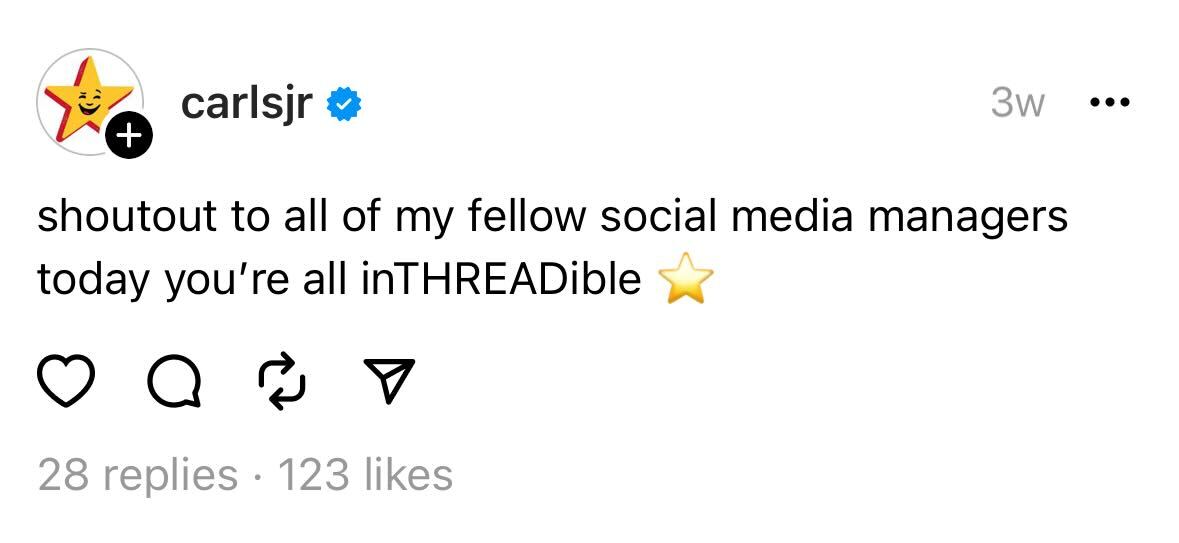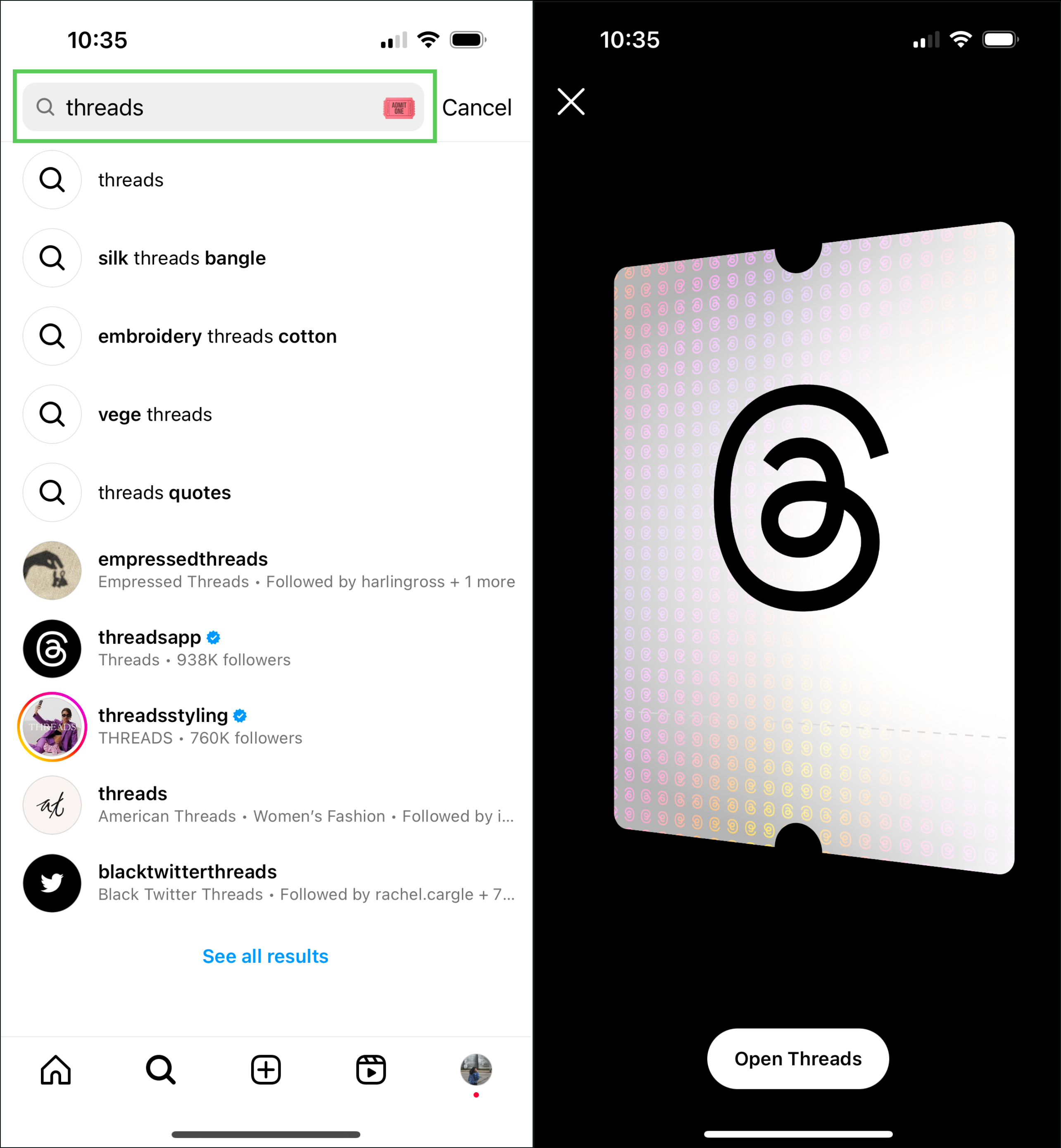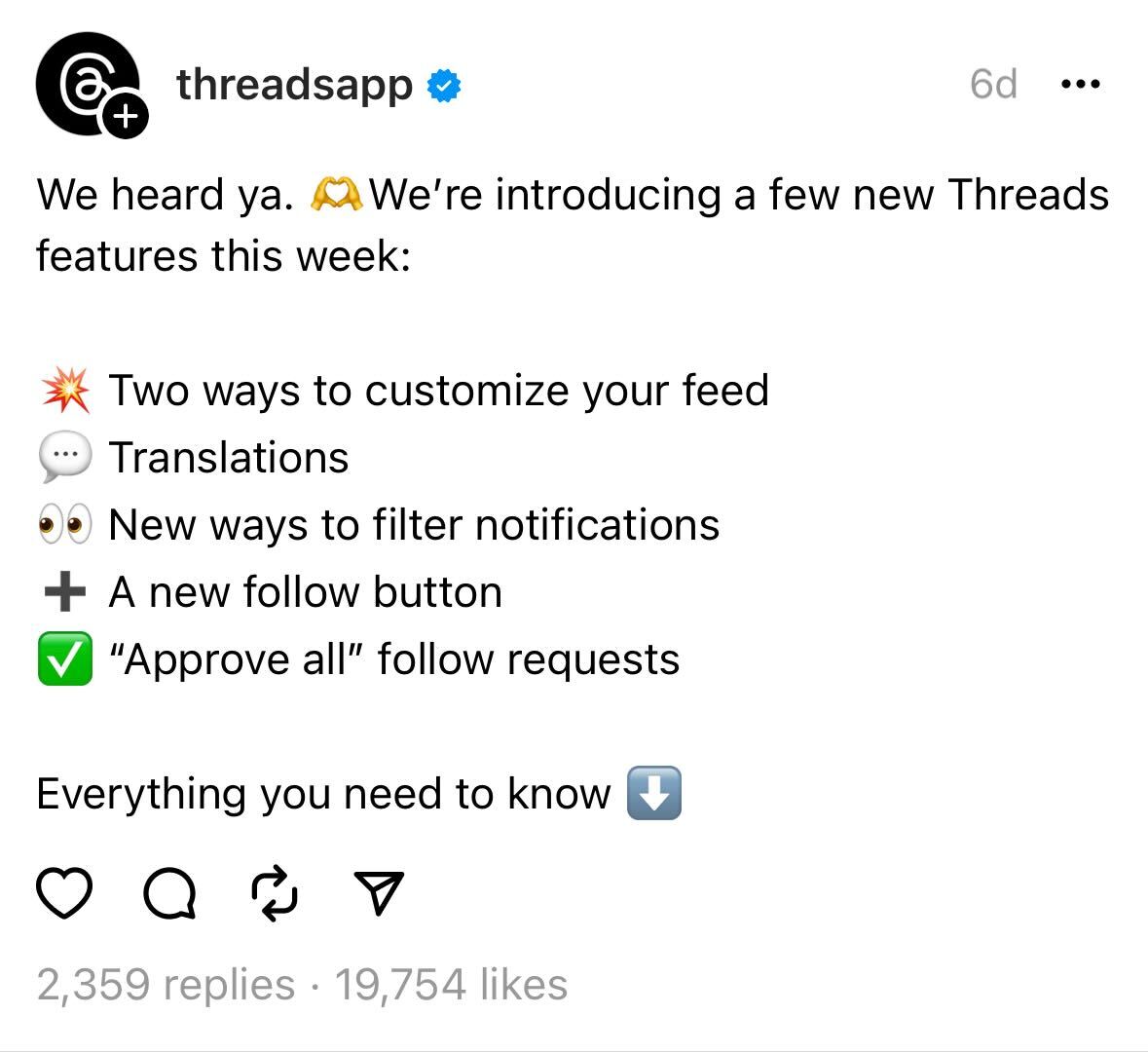Nothing captured first-day-of-school energy quite like the release of Threads, a new text-based social media platform from Meta.
The launch of a new social network is typically met with equal doses of curiosity and concern. The response to Threads was different. Brands and the social media managers that run them took to the platform with enthusiasm. Sure, there was some stress—expressed mainly in the form of overworked social media manager memes—but most seemed excited about the novelty and potential of a new platform.

Threads has generated a lot of discussion since then. What role will it play in existing social media strategies? What do consumers think about it? Does it have staying power?
Our team has spent the last month discussing these questions while experimenting with our approach to Meta’s latest platform. Along the way, we’ve learned quite a bit and have some hot takes of our own on what’s coming next.
What is Meta’s Threads?
Threads is a text-based social network developed by Meta’s Instagram team. The platform received 100 million sign-ups less than a week after its launch on July 5, 2023, making it the most rapidly downloaded app ever.
Some of the network’s instant popularity can be attributed to an exceptionally simple signup process. Users are required to have an Instagram account to sign up, maintaining the same account name, username and password across both networks.
How to create a Threads profile
To create a Threads profile, install the Threads app from the App Store or Google Play Store.
If you already have the Instagram app downloaded, you can also search “Threads” and tap the ticket icon that appears in the search bar.

When you open the Threads app for the first time, you’ll be prompted to log in with Instagram. At this point, you can also decide whether you’d like to auto-follow the accounts you follow on Instagram, or if you’d like to start your following list from scratch.
Once you do that, you’re ready to start Threading.
What features does Threads offer?
Threads will feel familiar to fans of text-based social media platforms. However, there are still little differences that give the app its own unique user experience.
Key features as of August 2023 include:
- Quick follow, which allows users to follow accounts they see in their feed without navigating to their profile by simply tapping the plus icon in the corner of the other user’s profile picture.
- Reply controls allow users to tighten the reins on who can engage with a specific post. Users can choose between the following audiences: Anyone, Profiles you follow and Mentioned only.
- Users can mute profiles by tapping the three dot menu on a post from the Threads account they’d like to mute.
- Users can also hide words and phrases from appearing in their Threads feed by navigating to the Privacy menu and tapping Hidden words.
- Tapping the Share button allows users to share Threads to their Instagram Story or grid.
- Tapping the Threads logo at the top of the app allows users to choose between two feed options: the For you feed displays posts from followed accounts, as well as recommended profiles. The Following feed displays posts only from profiles you follow.
Meta’s future plans for Threads
Since its launch a month ago, Threads users have been dreaming up additional features for the app. Luckily, Meta’s been in the mood to grant wishes.

Adam Mosseri, Head of Instagram, has taken to using his own Threads account to confirm what’s in-development for the app. According to Mosseri, confirmed features include a desktop version, hashtags, expanded search functionality and direct messaging.
Aside from ongoing feature releases, Meta is also working to build Threads into the fediverse. The fediverse is a new type of decentralized social network infrastructure that will allow people to follow and interact with users on independent but interconnected platforms, like Mastodon for example.
Meta has yet to announce when the Threads API will be released. However, social media managers can rest assured that we’ve shared the demand we’re already seeing among our customers.
We’re working closely with the team at Meta to open the API up as soon as possible, so you can schedule your Threads alongside the rest of your social content in Sprout.
Testing Threads: What we’ve learned one month post-launch
We wouldn’t offer any advice we haven’t personally tried for ourselves. That’s why we spent the last month experimenting with Threads and exploring how it may impact the overall social media landscape.
Use these tips and takeaways to lay the foundation for your own Threads strategy.
Engagement is the big opportunity (at least for today)
Threads gained a record-breaking user base in just a few days. A near effortless sign up experience combined with Meta’s influence in the social media industry made creating a profile an easy choice for brands and individuals alike.
Right now, it’s a mobile-only app with a closed API. Posting still feels personal, and a little attention from a brand can go a long way. While we wait for a native analytics tool or API access—whichever comes first—we’re prioritizing quality of engagements over quantity. What we lack in concrete KPIs, we’re making up for in surprise and delight.

However, we understand that senior leadership may not be too keen on dedicating time to a network that lacks the reporting functionality needed to prove its value. If you still believe Threads is the right play for your brand, sell them on the opportunity for 1:1 connections with customers, influencers and fans.
Threads is it’s own thing
If you haven’t noticed yet, text-based social media is having a moment.
You can’t talk about Threads without talking about Twitter, BlueSky, Spill or any of the other emerging players in the social media landscape. Naturally, a lot of the conversation veers toward comparison. It seems there can only be one network to rule them all, and people want to know who it’s going to be.
The truth is, the social media landscape is fracturing. A few networks have turned into many, each with their own unique user base and engagement norms. It’s a new era of social media, all about authenticity and community—which will look different across platforms.
Although Threads has a similar user experience to Twitter and other text-based social media networks, it has a different vibe. On top of that, the Instagram team has plans to continuously release features that will differentiate Threads from other social media networks.
Brands that treat Threads like it’s just another Twitter account will eventually lose out on the network’s unique value.
Let consumers show you what they’re looking for
Every social media network has its original intended use, how people actually end up using it, and all the features built to connect the two.

This push and pull can be seen in many of your favorite social networks. For example, TikTok is most commonly known as a platform for short-form videos, but photo slideshows are gaining popularity on the platform and recently, the app launched text posts.
Threads may be synonymous with text right now, but that doesn’t mean people aren’t using it to share photos and videos. When it comes to developing your strategy, embrace variety. Share a consistent mix of content types—static images, text, video, etc.—to narrow in on what people are responding to.
Are you thread-y for a new social media network?
A month out from launch, Threads is still on the way to becoming itself. Right now, conversations on the network feel both organic and positive. There’s an intimacy that you can only find in an up-and-coming platform. Once Threads expands its daily active users and influence, the atmosphere will undoubtedly change.
If you have the resources needed to manage a Threads presence natively, it’s worth considering as a place to experiment with your brand personality. How can your business sound more authentic online? How can you make customer care interactions feel more real? These are the questions you can unravel on Threads today.
That said, running a new brand account is no small responsibility. If you’re still on the fence, try asking these five questions MIT’s Director of Social Media Strategy, Jenny Li Fowler, always asks before starting a new social media account.